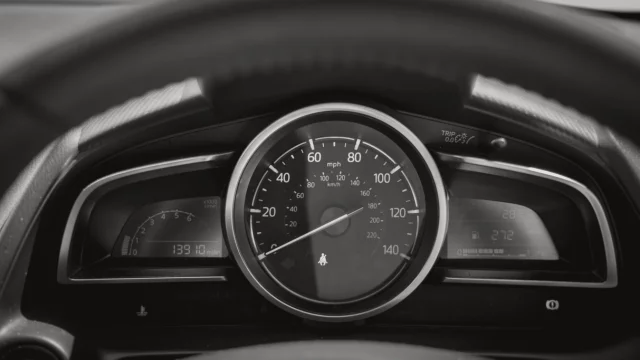Buying a new car directly from the showroom is an exciting venture, but determining the ideal mileage can be a puzzling task for many.
In this comprehensive guide, we delve into the question, “How Many Miles a New Car Should Have?” to provide insights and guidance for prospective car buyers.
Mileage for a New Car: What Does a Mileage Tell You About a Car
Mileage, odometer reading or the number of miles a car has traveled, is a critical factor influencing a vehicle’s condition, longevity, and resale value. Striking the right balance is key to ensuring a satisfactory ownership experience.
Shopping for a used car? Don’ t be a victim of odometer fraud. Verify the mileage before purchase with our odometer rollback check by VIN tool.

The Myth of Zero Miles: When is a Car Considered New?
The term “new car” often conjures images of a clean vehicle with zero miles on the odometer. While this is the case for many brand-new cars straight from the factory, it’s essential to acknowledge that some cars may have a few miles due to factors like transportation from the factory to the dealership.
According to Car and Drive, an acceptable mileage range for a new vehicle is from 50 to 200 miles. Mileages exceeding this range could prompt inquiries regarding its classification as a “new” car.
Delivery Mileage: How many miles are too many for a used car
In the automotive industry, it’s customary for brand new cars to have a limited number of delivery miles. These miles accrue during the transportation of the vehicle from the manufacturing facility to the dealership.
Typically, delivery miles range from single to double digits (10 miles and even up to a hundred miles), and this is considered acceptable within industry norms.
The little miles are acceptable when purchasing a new car and the car is still considered new and not used.

Setting Expectations for Brand-New Cars
For those expecting a car with absolutely zero miles, communicating preferences with the dealership is crucial. While zero-mile cars are possible, they may be subject to specific conditions and arrangements with the dealer.
Mileage Considerations for Test Drives
Test drives are an integral part of the car-buying process. Prospective buyers often take new cars for test drives to assess performance, comfort, and overall suitability.
Consequently, it’s common for new cars to have a minimal increase in mileage due to these test drives.
Ideal Mileage Range for a New Car
Determining the ideal mileage for a new car involves considering the specific circumstances mentioned earlier.
In general, delivery miles and those accrued during test drives should not significantly impact the overall condition or lifespan of the vehicle.
Factors Influencing New Car Mileage
Several factors can influence the mileage a new car might have before reaching the hands of the buyer:
- Transportation Distance: The distance between the manufacturing facility and the dealership plays a significant role in determining the delivery miles. Cars transported across longer distances may accrue slightly higher mileage. Buyers should recognize that transportation is an unavoidable part of the logistics process, and a reasonable number of delivery miles are expected.
- Dealer Location: The location of the dealership in relation to the manufacturing facility affects the distance a new car needs to travel before reaching the buyer. Proximity can result in fewer delivery miles. Buyers should consider that dealerships closer to the manufacturing site may offer cars with lower delivery miles compared to those located farther away.
- Brand Policies: Different automotive brands may have varying policies regarding new car mileage. Some brands may adhere to stricter guidelines, while others might have more flexible practices. Buyers should familiarize themselves with the policies of the specific brand they are interested in to understand the range of delivery miles deemed acceptable.
- Test Drive Policies: Dealerships often allow potential buyers to take new cars for test drives. The mileage accrued during these test drives can vary based on dealership policies. Buyers should be aware that a modest increase in mileage due to test drives is a common practice. Clear communication with the dealership about test drive policies is essential.
Balancing the Expectations and Realities of Miles on New Cars
In the contemporary automotive landscape, a new car with a minimal number of delivery miles is a reasonable expectation.
Buyers should communicate preferences with dealerships and be aware that a few miles from transportation and test drives are industry-standard practices.
While low mileage is often associated with higher resale value, the minimal miles on a new car should not significantly impact its long-term value.
Modern cars are designed to provide reliable performance for many miles, and a reasonable number of delivery and test drive miles are unlikely to affect resale negatively.
What is Higher Mileage for a New Car?
Determining what mileage is too high for a new car depends on various factors. Every new car accumulates some mileage during the transportation process from the manufacturing facility to dealerships.
Typically, cars are considered new until they are sold for the first time to a consumer. The mileage may result from transport from the shipping port or between dealerships, and even test drives.
It’s common for new cars to have a few dozen or a couple of hundred miles on the odometer.
However, much mileage accrued on a new car could be a cause for concern. If a new car has unusually high mileage, it might indicate excessive test driving or transport issues.
High mileage on a new car may affect its resale value, and some buyers use vehicle history reports to ensure they get cars with minimal mileage for the perception of better long-term reliability.
When buying new, it’s advisable to inquire about the source of the mileage and ensure it aligns with standard transportation and dealership practices.
Ultimately, determining an acceptable mileage for a new car depends on your preferences and expectations for a clean, untouched vehicle.
To Conclude
Understanding how many miles a new car should have involves considering industry norms, dealership policies, and personal preferences. Performing a mileage check before finalizing your purchase can help ensure the vehicle hasn’t been excessively driven prior to delivery.
Communicating openly with dealerships and being aware of the factors influencing new car mileage are key steps in ensuring a satisfying buying experience.
Ultimately, a few delivery and test drive miles should not overshadow the joy and excitement of owning a brand-new vehicle.
Frequently Asked Questions
Ideally, how many miles should a new car have when purchased?
The optimal mileage for a new car typically ranges between 5 and 50 miles. Higher figures may indicate test drives or short-term use as a demo vehicle.
Is there a specific threshold for new car mileage, and why does it matter?
While preferences vary, a new car with under 100 miles is generally considered ideal. Lower mileage ensures minimal wear and tear, offering a longer lifespan.
Are there exceptions to the "low mileage" rule for new cars?
Some luxury or specialty models may have slightly higher mileage due to additional testing or transport. However, it’s crucial to assess the reasons behind any deviations.
How does new car mileage impact long-term reliability and resale value?
Lower mileage often translates to better long-term reliability and a higher resale value. Buyers typically prefer vehicles with fewer miles, assuming they’ve been well-maintained.










